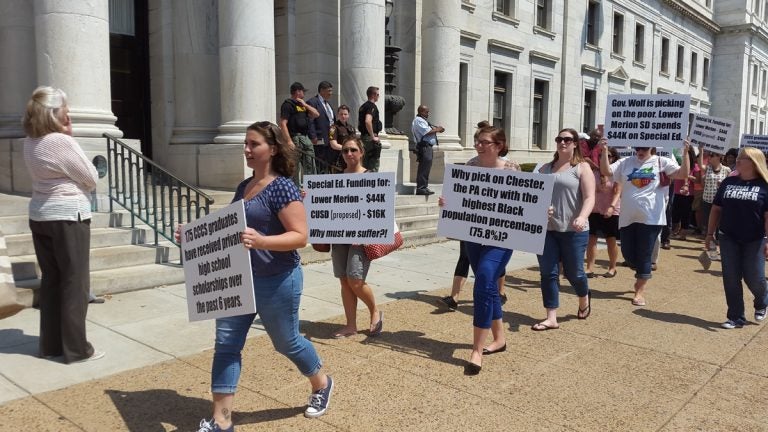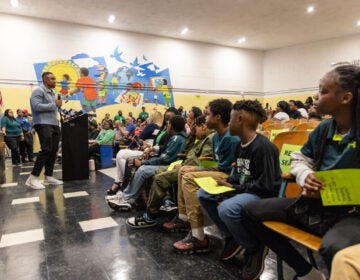Special education funding at heart of budget fight in Chester-Upland

Parents and teachers march with their messages in front of the Chester County Courthouse Monday. (Laura Benshoff/WHYY)
Delaware County Court of Common Pleas Judge Chad Kenney is hearing arguments on a state-led plan to fix the Chester-Upland School District’s long-standing budget woes.
Without the plan, according to Gov. Tom Wolf and other proponents, the district will not have enough money to operate for full school year and may not open on September 2.
Last week, Gov. Wolf — along with the state-appointed receiver Francis V. Barnes — introduced a five-point strategy to eliminate the Chester-Upland School District’s $24 million deficit and “right Chester Upland’s sinking financial ship.”
The cornerstone of the state’s plan is reducing tuition payments the district pays to send special education student to charter schools. According to the Chester-Upland’s most recent school performance profile, 4,224 students attend charters while 2,985 go to District-run schools.
Over the past five years, special education tuition rates for students in charter schools have increased from $23,000 per student to $40,000 per student, according to Barnes. Rates for regular education stayed stable at about $10,000, he testified on Monday.
The other changes include slashing cyber charter payments, to $5,959 per student to reflect what the Wolf administration says are the true costs of educating a kid online. They are also demanding a forensic audit, hiring a financial turnaround specialist to refinance some of the Chester-Upland’s existing debt, and partial forgiveness of a $10 million loan from the Pennsylvania Department of Education.
With these changes, Chester-Upland would not only eliminate its deficit but would become financially solvent, Barnes testified.
The bulk of the savings comes from the reduction of special education tuition, nearly $20 million, most of it from Chester Community Charter School.
Four lawyers representing various charter schools — both cyber and brick-and-mortar — that serve Chester-Upland students took turns trying to poke holes in the state’s tuition calculations.
Nearly half of a six hour hearing was devoted to unpacking and understanding special education funding for charter school students.
The state brought out receiver Francis V. Barnes, Director of the Bureau of Special Education Pat Hozella and Dean Kaplan, managing director of Public Financial Management, a consulting firm engaged in financial management for the district, to make its case.
Understanding numbers that are hairy and abstruse is the key to understanding the state’s plan — and where millions of dollars have been going in the Chester-Upland school district over the last five years. Here is a rough breakdown of the calculations.
When calculating what is says is a more reasonable special education payment, the state is combining a base rate calculated for regular education students with a “supplemental” rate, to account for the extra costs of education someone with special needs. That’s how it arrived at the $16,000 figure.
The base rate is calculated by taking the amount spent by charter schools in Chester-Upland last year divided by the average daily membership, a proxy for the total number of students.
“That number is currently $10,683,” said Kaplan.
To get the supplemental rate, Hozella used data reported by the charter schools as required by Act 16, or “The Reporting of Expenditures Relating to Exceptional Students,” on an annual basis.
Through those reports, Hozella said she was able to see how much the schools were already claiming for their students and how many employees the schools devote to special education.
Schools also report how severe the disabilities of their students are, into several categories. The most common category in the Chester-Upland schools is itinerant, or students spending 20 percent or less of their school day in special classes.
Hozella said she used this information, combined with real salary data from teachers, aides, psychologists and a variety of therapists engaged at the schools to calculate how much it would cost for the schools to continue to serve their students to the “free and appropriate public education” required by the law.
“It came in significantly less than the $16,000…it came in approx at $5,400 per student,” said Hozella. Another ten percent was added to make the amount more conservative.
That’s in addition to the $10,000 base rate. Remember, the schools have been receiving $40,000.
Counsel for the charter schools argued that the calculation could not be equitable, since the state did not run similar numbers for traditional public schools.
Hozella said the public school teachers get paid far more than those in charter schools, and Chester-Upland pays to send more than 100 students to schools outside of the district for adjudication or special services, expenses not incurred by charter schools, so the comparison would not be fair.
Counsel for the charter schools also argued that the state should be looking to cut the District’s expenses as well, not just charter payments.
Kenney had a response to that line of questioning.
“Last year they cut back pretty much to the bare bone,” he said. We have a $24 million deficit, we don’t want to cut any more services.”
One of the biggest revelations came from Kaplan towards the end of the marathon hearing. He revealed that the charter schools self-report their special education expenses in three categories: $25,000 or less, $25,000-$50,000, or $50,000-$75,000.
Based on these reports, generated through Act 13, “I do know that they don’t have any students that they spend more than $25,000 on,” he said.
Outside the courtroom, CEO of Chester Community Charter School David Clarke said he didn’t think those reports captured the full expenses incurred by his school.
“The numbers that the Department of Education presented didn’t take in a lot of other considerations, a lot of other variables,” he said. “We have programs for children that aren’t necessarily on paper.” He said the school has sixty students that could be sent out of the district but are given special consideration to stay in the school.
Clifford Haynes, counsel for Chester Community Charter school, which serves nearly half the students in the District and stands to lose over $17 million if the state’s recovery plan is enacted, argued continually that the charter law dictates rate of tuition — not the executive branch of the state government.
“I’m not necessarily thinking it’s outside the law,” said Kenney. “There are two laws. There’s a charter law and there’s a distressed district law. I don’t know how I’m going to look at it yet.” He said the Commonwealth Court may be the final arbiter.
Hearings are ongoing and Kenney must reach a decision within ten days of the petition date – just in time for the new school year.
WHYY is your source for fact-based, in-depth journalism and information. As a nonprofit organization, we rely on financial support from readers like you. Please give today.




